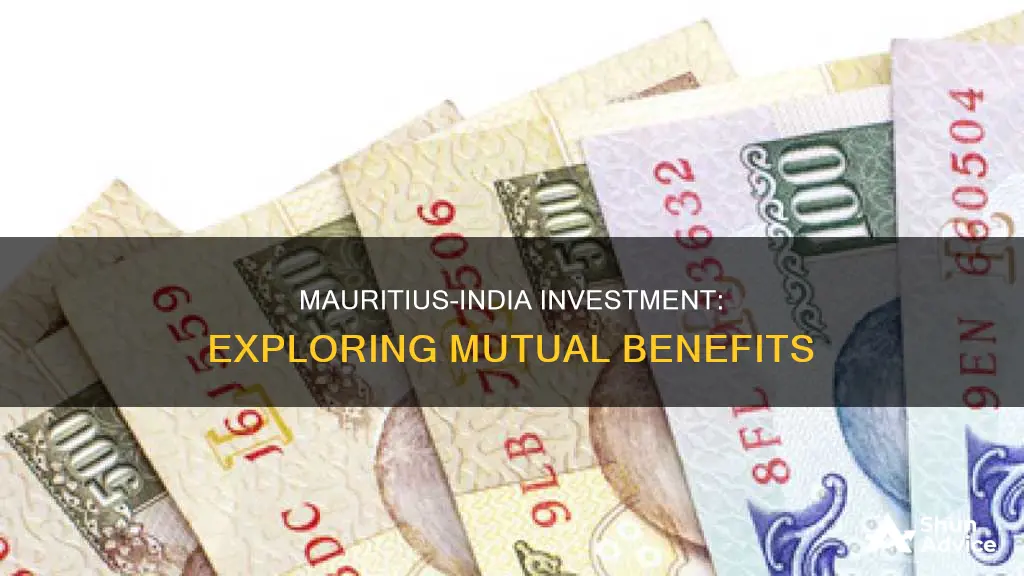
Mauritius is the main provider of foreign direct investment (FDI) to India, with a total of $134.5 billion invested between 2000 and 2019. This is largely due to Mauritius's status as a tax haven, with a low 3% effective tax rate, no withholding tax, and no capital gains tax on dividends, making it an attractive place for companies to set up shell companies and reroute investments through. This practice, known as treaty shopping or investment round-tripping, involves taking advantage of the lower tax rates in Mauritius compared to India, and has resulted in Mauritius being the largest source of FDI into India for many years.
| Characteristics | Values |
|---|---|
| Mauritius's status as a tax haven | Mauritius has a corporate tax rate of 15%, but the effective tax rate is only 3%. There is no withholding tax and no capital gains tax on dividends. |
| Mauritius's role as a conduit for investments | Between 2000 and 2017, 34% of all FDI received by India came from Mauritius. However, it is believed that much of this investment is routed through Mauritius from other countries as a form of tax evasion. |
| India-Mauritius relations | The two countries have a Double Taxation Avoidance Agreement (DTAA), which has helped Mauritius develop its financial services industry and benefited India through FDI and job creation. |
| Regulatory recognition | Mauritius has a stringent legal and regulatory framework recognized by the IMF, FSB, and OECD to combat money laundering. It also appears on the OECD White List of Jurisdictions that have substantially implemented internationally agreed tax standards. |
What You'll Learn
- Mauritius' status as a tax haven makes it an attractive place to reroute investments through
- Mauritius has a low 3% capital gains tax
- Mauritius has a stringent legal and regulatory framework
- India and Mauritius have a Double Taxation Avoidance Agreement (DTAA)
- Mauritius is geographically close to India and shares cultural affinities and historical ties

Mauritius' status as a tax haven makes it an attractive place to reroute investments through
Mauritius has gained a reputation as a tax haven, offering a low-tax environment, double taxation treaties, and a stable political system. This makes it an attractive location for offshore financial activities, particularly for companies seeking to minimise their tax liabilities.
The country's corporate tax rate is 15%, but it can be as low as 3% for companies engaged in global business activities, which can benefit from a partial exemption regime. Mauritius also has no withholding tax and no capital gains tax on dividends. This makes it an ideal location for rerouting investments through, as companies can take advantage of lower tax rates and form shell companies to make investments in other countries, such as India. This practice is known as "treaty shopping" or "investment round-tripping".
The use of Mauritius as a tax haven has not been without controversy. Critics argue that its tax policies divert revenue from developing countries, particularly in Africa. There have been concerns about global wealth inequality and the ethics of offshore finance. Despite this, Mauritius has taken steps to enhance its reputation and comply with global financial standards, implementing reforms to address transparency issues and strengthen its regulatory framework.
In summary, Mauritius' status as a tax haven, with its low tax rates and favourable treaties, makes it an attractive place for companies to reroute their investments through in order to minimise their tax liabilities.
Social Security Investment Strategies: Maximizing Your Savings
You may want to see also

Mauritius has a low 3% capital gains tax
Firstly, Mauritius has a robust and stringent legal and regulatory framework that has been recognised by the International Monetary Fund, Financial Stability Board, and the Organisation for Economic Co-operation and Development (OECD). It is also on the OECD's White List of Jurisdictions, which means it has successfully implemented internationally agreed tax standards. This provides credibility and security for investors.
Secondly, Mauritius has a low corporate tax rate of 15%, with an effective tax rate of only 3% for certain transactions. Additionally, there is no withholding tax and no capital gains tax on dividends in Mauritius. These factors significantly reduce the tax burden for investors.
Thirdly, Mauritius has geographical proximity, cultural affinities, and historical ties with India, making it a more familiar and accessible investment destination for Indian investors.
Lastly, Mauritius offers a Premium Investor Certificate to companies investing at least MUR 500 million (around $10.5 million). This certificate provides rebates, exemptions, and preferential rates for taxes, duties, fees, charges, and levies, further enhancing the attractiveness of investing through Mauritius.
By taking advantage of the low 3% capital gains tax and other favourable tax policies in Mauritius, investors can minimise their tax obligations while accessing the Indian market. This has made Mauritius the main provider of foreign direct investment (FDI) to India, with 39.6% of FDI to India originating from Mauritius between 2001 and 2011.
Investment Bankers: Crafting Portfolios, Analyzing Fundamentals
You may want to see also

Mauritius has a stringent legal and regulatory framework
Mauritius is also compliant with norms prescribed by multiple international organisations, including the International Organization of Securities Commissions, Iowa Interstate Railroad, Financial Action Task Force on Money Laundering, and the Basel Committee. The country has enacted relevant legislation, such as the Mutual Assistance in Criminal and Related Matters Act and the Financial Intelligence and Anti-Money Laundering Act 2002, which provides a framework for information exchange on money laundering with members of international financial intelligence groups. Additionally, the Asset Recovery Act was established to broaden the scope for freezing illicitly obtained assets.
The comprehensive legal and regulatory framework in Mauritius helps to ensure the credibility of its jurisdiction for financial services. The country's commitment to combating money laundering and adhering to international tax standards enhances its reputation as a responsible financial transaction centre. These factors contribute to Mauritius' attractiveness as a conduit for investments into India, facilitating the flow of Foreign Direct Investment (FDI) into the Indian market.
Assessing Investment Portfolios: Strategies for Success
You may want to see also

India and Mauritius have a Double Taxation Avoidance Agreement (DTAA)
The DTAA between India and Mauritius has been a significant factor in Mauritius's investment in India. Mauritius is the largest source of foreign direct investment (FDI) into India, accounting for 34% of all FDI received by India between 2000 and 2017. The low effective tax rate of 3% in Mauritius, along with its status as a tax haven, has made it an attractive conduit for investments into India. This practice, known as "treaty shopping" or "investment round-tripping," involves routing investments through Mauritius to take advantage of its lower tax rates.
However, there have been concerns about the potential for tax evasion and the misuse of the DTAA by investors. In 2016, India amended its tax treaty with Mauritius to address these issues, and in 2019, capital gains on investments made in India through Mauritian firms became fully taxable. The introduction of the Principal Purpose Test (PPT) in the 2024 amendment further aims to curtail tax avoidance by ensuring that treaty benefits are only granted for transactions with a genuine purpose.
The DTAA has benefited both countries, with Mauritius developing its financial services industry and India attracting FDI and creating jobs. The agreement has encouraged mutual trade and investment, making both countries attractive destinations for investment by offering tax benefits and the opportunity to avoid double taxation.
Indie Directors: To Invest in Camera Equipment or Not?
You may want to see also

Mauritius is geographically close to India and shares cultural affinities and historical ties
The close proximity of Mauritius to India, as well as their shared cultural and historical ties, makes Mauritius an attractive conduit for investments into India. The island nation's low 3% capital gains tax, quality regulatory framework, professional labour force, and favourable tax treaties with India have also contributed to its position as the top source of FDI for India.
The tax treaty between India and Mauritius, known as the Double Taxation Avoidance Agreement (DTAA), has been a significant factor in the flow of investments through Mauritius. This treaty allows capital gains to be taxed in Mauritius, and India provides specific relief to taxpayers through its Income Tax Act 1961 to avoid double taxation. Mauritius's effective tax rate of 3% is significantly lower than its corporate tax rate of 15%, and the absence of withholding tax and capital gains tax on dividends makes it a favourable location for companies investing in India.
The use of Mauritius as a tax haven has led to the practice of "treaty shopping" or "investment round-tripping," where investments are rerouted through the island nation to take advantage of lower tax rates. This has resulted in concerns and actions by the Indian government to address these issues.
Savings to Investment: The Role of Financial Institutions
You may want to see also
Frequently asked questions
Mauritius is a tax haven, which makes it an attractive place for companies to reroute their investments through. Mauritius has a corporate tax rate of 15%, but the effective tax rate is only 3%. Additionally, the island has no withholding tax and no capital gains tax on dividends.
Companies can set up shell or holding companies in Mauritius, where no economic activity exists, so that money made elsewhere can be funnelled into their Mauritian entity for tax avoidance.
Very. Between 2000 and 2017, 34% of all FDI received by India came from Mauritius, totalling $134.5 billion. It is believed that the vast majority of FDI from Mauritius is routed through a low-tax jurisdiction like this.
In 2016, India amended its double tax avoidance agreements with Mauritius and Singapore, removing preferential tax benefits. In April 2019, capital gains on investments made in India through firms in these countries became fully taxable.







